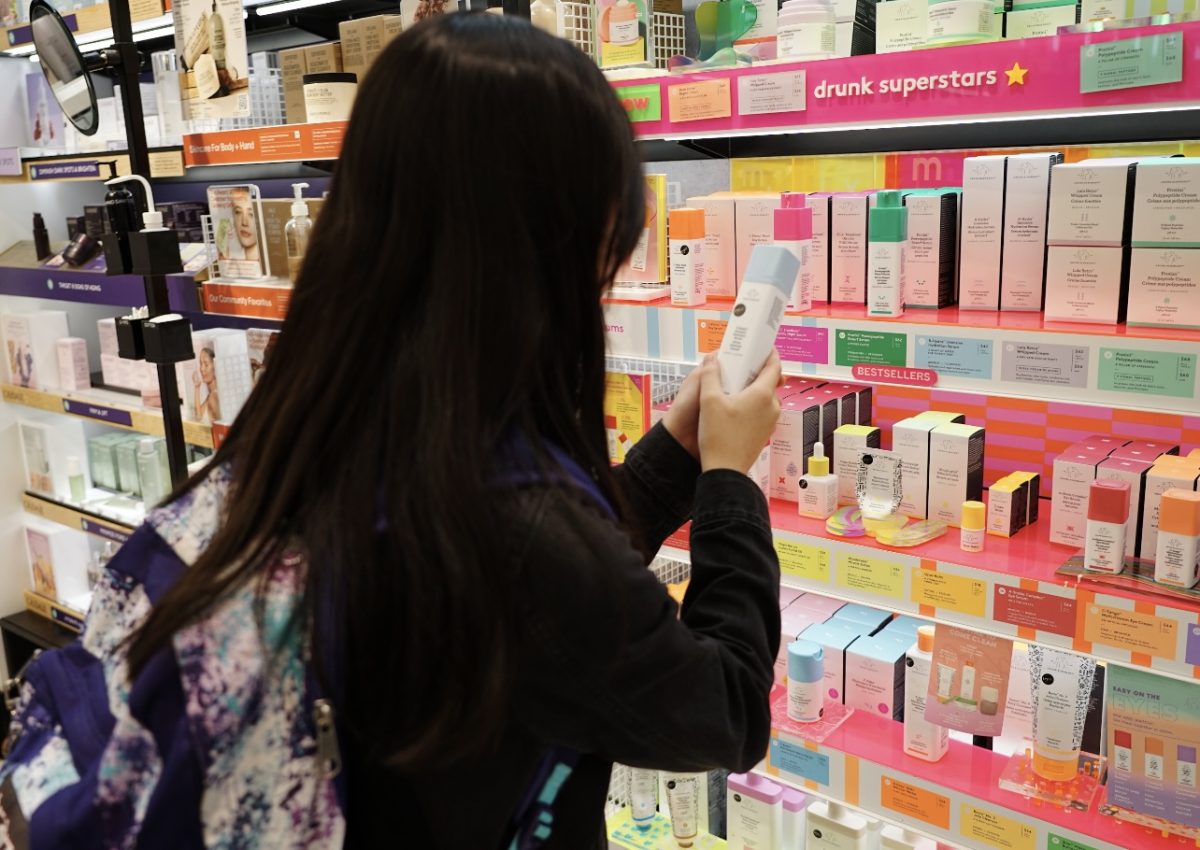With the development of major brands that can ship products out within days, humans have created an environment that normalizes and encourages purchases based on aesthetic appeal. Although a globalized network is convenient, it is harmful as young kids quickly adopt a consumer mentality, even when they have yet to understand how the economy functions.
Even though many industries have rapidly evolved to alarming levels of growth, the skincare industry has become infamous for gaining profit from younger audiences. Anti-aging campaigns have taken over skincare companies as they produce serums and creams that are said to be essential to one’s health. But what happens when these “essentials” begin to harm a consumer’s overall mental and physical wellbeing?
Social media apps like Instagram and TikTok have created algorithms where users are shown countless advertisements with every scroll and click. Not only are these advertisements released through their companies, but influencers also promote them through product placement. To make matters worse, users are met with more products that appeal specifically to them through personalized ads.
Because the age group on social media has decreased significantly, advertisers have begun to hop onto trends to make their products more appealing to youths. This combination is detrimental to younger audiences as they struggle to decide whether or not they should engage in the next big fad. Grace Kinan (II) states that young kids should not indulge in skincare “unless it is an actual need and not just use it because it’s a trend.”
The biggest contributor to the rise of new trends is fast fashion, encouraging frequent purchases of inexpensive items. This perpetuates a culture of materialism and encourages children to form false ideas about the true costs of goods when they are produced unethically. Many buy products which they only use once, then disregard when the trend declines. Young teens are pressured to purchase the latest trend to conform to society’s unrealistic expectations.
One such expectation is the fear of adopting signs of aging, which many of today’s teens express. This causes skewed perceptions of what natural aging looks like. The beauty standards for young adults have increased when it comes to eradicating acne and preventing wrinkles. Although the fear of aging has always been prominent, it now takes on a dangerous form as children use products that cause harm to their delicate complexions. Dr. Brooke Jeffy, a dermatologist, details how one of her tween patients developed a rash around her eyes from retinol “all for trying to use an anti-aging product that she [didn’t] need.”
Along with skewed perceptions of development, consumer culture links happiness with unrealistic beauty standards by promoting certain body types as ideal through media. Constant exposure to these images creates cultures rife with envy and comparison. Youth begin to judge themselves against unrealistic criteria, leading to the development of low self-esteem. Their body images also become distorted as they are forced to perceive the ideal standard at an even younger age.
Hollis Cole (I) adds, “It’s especially upsetting that these messages are being sent to adolescents […] at a crucial point of development. […] Internalizing these messages can lead to difficulties with loving and accepting oneself that can last their entire life.”
The use of abrasive products is also harmful because children can quickly become hyper-focused on preventing signs of aging while simultaneously aging themselves as they engage in this mature form of self-care.
Although it is easy to blame youth, it is important to acknowledge that the majority of the issue stems from the manipulation of young children and the vast, unobstructed access they have to the internet. Alicia Mo (III) mentions, “These children don’t know what’s right or wrong for them, and it’s the job of their parents to teach them.”
Skincare is very empowering for many older users. The technological developments of products can aid young adults in feeling more confident about their complexions. Nevertheless, as consumerism is ingrained into the minds of teens, driving them to mature prematurely, it will inevitably reshape society’s values, attitudes and behaviors, impacting future generations.
Children deserve the opportunity to enjoy their childhood without fixating on the consumption of products beyond their developmental needs. Ten-year-olds should spend their time in nature, engaging in enriching activities and spending time within educational environments — not at Sephora.








